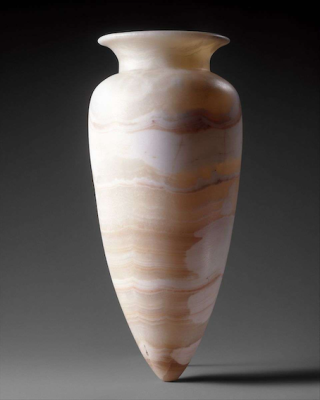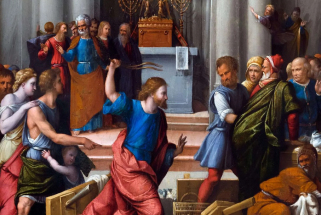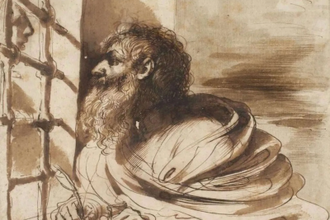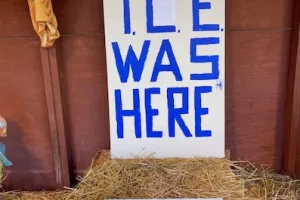Gospel in Art: A woman brought with her an alabaster jar of ointment

Egyptian high shouldered ointment jar, Old Kingdom 2500-2400 BC alabaster © Metropolitan Museum of Art, New York
Source: Christian Art
Gospel of 19 September 2024
Luke 7:36-50
One of the Pharisees invited Jesus to a meal. When he arrived at the Pharisee's house and took his place at table, a woman came in, who had a bad name in the town. She had heard he was dining with the Pharisee and had brought with her an alabaster jar of ointment. She waited behind him at his feet, weeping, and her tears fell on his feet, and she wiped them away with her hair; then she covered his feet with kisses and anointed them with the ointment.
When the Pharisee who had invited him saw this, he said to himself, 'If this man were a prophet, he would know who this woman is that is touching him and what a bad name she has.' Then Jesus took him up and said, 'Simon, I have something to say to you.' 'Speak, Master' was the reply. 'There was once a creditor who had two men in his debt; one owed him five hundred denarii, the other fifty. They were unable to pay, so he pardoned them both. Which of them will love him more?' 'The one who was pardoned more, I suppose' answered Simon. Jesus said, 'You are right.'
Then he turned to the woman. 'Simon,' he said 'you see this woman? I came into your house, and you poured no water over my feet, but she has poured out her tears over my feet and wiped them away with her hair. You gave me no kiss, but she has been covering my feet with kisses ever since I came in. You did not anoint my head with oil, but she has anointed my feet with ointment. For this reason I tell you that her sins, her many sins, must have been forgiven her, or she would not have shown such great love. It is the man who is forgiven little who shows little love.' Then he said to her, 'Your sins are forgiven.' Those who were with him at table began to say to themselves, 'Who is this man, that he even forgives sins?' But he said to the woman, 'Your faith has saved you; go in peace.'
Reflection on the Alabaster Ointment Jar
The alabaster jar I am sharing with you today is perhaps not that dissimilar to the one used by the woman in our Gospel reading. It is about the size of a small perfume bottle, reflecting the kind of container that was commonly used in ancient times for holding precious ointments and perfumes. Alabaster jars, such as the one illustrated here, were used as far back as ancient Egypt and remained popular throughout the Greek and Roman empires. They were typically used for storing valuable oils, perfumes, and other cosmetic products.
Alabaster itself is a soft, slightly porous stone, which makes it ideal for carving intricate designs. Its beauty lies not only in its carvability but also in its translucency. A unique feature of alabaster is that by holding the jar up to the light, one can see through the stone to check how much oil or perfume remained inside. This practical advantage, combined with the material's aesthetic appeal, made alabaster jars highly prized possessions.
In today's Gospel, this alabaster jar takes on a deeper symbolic meaning. Every meal that Jesus shared with others reveals something to us as a Christian community. While the Last Supper is the most well-known, other instances of Jesus sharing a meal in the Gospels also carry great significance. In today's reading, the woman who approaches Jesus is weeping, her tears an outward sign of the inner turmoil and sorrow she feels. Her actions-anointing Jesus with the perfume from the alabaster jar-are extravagant gestures of humility and love.
Jesus takes his time to explain to Simon the Pharisee the depth of this woman's actions. Her tears, the water she used to wash His feet, and the oil from the alabaster jar were expressions of her repentance and gratitude. Similarly, Jesus notices the small gestures of love and devotion we offer to Him in our daily lives. Just as the woman's actions, though seemingly simple, were rich with meaning, so too are the small acts of kindness we perform for others. Jesus sees and values each one.
LINKS
Gospel in Art: https://christian.art/
Today's Reflection: https://christian.art/daily-gospel-reading/luke-7-36-50-2024/


















